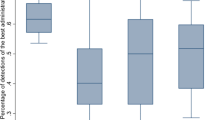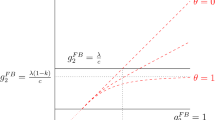Abstract
We consider an economy composed of two regions. Each of them provides a public good whose benefits reach beyond local boundaries. In case of decentralization, taxes collected by members of a region are spent only on that region's public good. In case of centralization, tax receipts from the two regions are pooled and used to finance both public goods according to the population size of each region. The experiment shows that centralization induces lower tax morale and less efficient outcomes. The reasons are that centralization gives rise to an interregional incentive problem and creates inequalities in income between regions.
Similar content being viewed by others
Author information
Authors and Affiliations
Corresponding author
Rights and permissions
About this article
Cite this article
Güth, W., Levati, V. & Sausgruber, R. Tax morale and (de-)centralization: An experimental study. Public Choice 125, 171–188 (2005). https://doi.org/10.1007/s11127-005-3414-7
Accepted:
Issue Date:
DOI: https://doi.org/10.1007/s11127-005-3414-7




